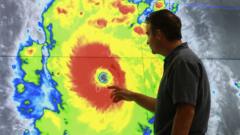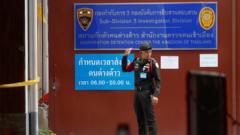On January 28, 2025, reports emerged about a harrowing deportation flight overseen by the Trump administration, which ended with chaos and severe criticisms from Brazilian officials. The flight, carrying 88 deportees bound for Brazil, faced technical difficulties while on the tarmac in an Amazon city, resulting in soaring cabin temperatures that contributed to a distressing atmosphere.
Inside a Disturbing U.S. Deportation Flight: Chaos and Criticism

Inside a Disturbing U.S. Deportation Flight: Chaos and Criticism
A troubling deportation incident involving Brazilian nationals stirs diplomatic tensions and raises questions about the treatment of deportees.
Deportees, many of whom were shackled and handcuffed, reported an overwhelming situation heightened by a malfunctioning air conditioning system. Eyewitness accounts detailed scenes of panic, with children crying and adults fainting while immigration officers blocked exits. Amid the turmoil, some passengers resorted to triggering emergency exits, escaping onto the wing of the aircraft in desperation, pleading for assistance.
In the aftermath, Brazilian federal police intervened, compelling U.S. agents to release the detainees despite the flight's incomplete journey. Reacting to the treatment of the deportees, Brazilian President Luiz Inácio Lula da Silva mobilized military resources to ensure their safe return to Brazil. His administration publicly condemned the actions of the Trump administration, deeming them “unacceptable” and “degrading.”
The situation escalated further when Colombian President Gustavo Petro criticized the U.S. deportations on social media, leading to a diplomatic spat over U.S. tariffication threats. Ultimately, Colombia opted to deny two U.S. deportation flights, although as tensions simmered, Petro capitulated to avoid wider economic disputes.
This incident underlines the broader implications of U.S. immigration policies and the complexities of international relations surrounding deportations, as the treatment of migrants continues to elicit scrutiny and condemnation worldwide.
In the aftermath, Brazilian federal police intervened, compelling U.S. agents to release the detainees despite the flight's incomplete journey. Reacting to the treatment of the deportees, Brazilian President Luiz Inácio Lula da Silva mobilized military resources to ensure their safe return to Brazil. His administration publicly condemned the actions of the Trump administration, deeming them “unacceptable” and “degrading.”
The situation escalated further when Colombian President Gustavo Petro criticized the U.S. deportations on social media, leading to a diplomatic spat over U.S. tariffication threats. Ultimately, Colombia opted to deny two U.S. deportation flights, although as tensions simmered, Petro capitulated to avoid wider economic disputes.
This incident underlines the broader implications of U.S. immigration policies and the complexities of international relations surrounding deportations, as the treatment of migrants continues to elicit scrutiny and condemnation worldwide.






















